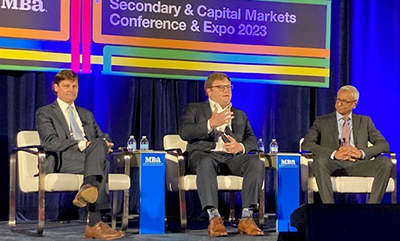
#MBASecondary23: The Future of Financial Stability

(MBA Chairman Matt Rocco (l) with Isaac Boltansky of BTIG and Bose George of KBW Monday at the MBA Secondary Market Conference & Expo.)
NEW YORK—What issues are affecting the financial markets? How many fingers do you have?
Here at the Mortgage Bankers Association’s National Secondary Market Conference & Expo, panelists said much of the future depends on what happens—or doesn’t happen—in Washington, D.C. over the next year or so.
“Washington does two things well: ‘nothing’ and ‘overreact,’” said Isaac Boltansky, Director of Policy Research with BTIG, Washington. “My fear is that when it comes to IMBs and the secondary market, Washington is going to do the latter.”
Boltansky said he expects a tightening of regulations for most banks. “The supervisory changes are already happening; the stories we’re hearing from our clients about what supervisors are asking for lately makes them seem more like equity analysts. They don’t want to be caught flat-footed again, so it’s going to change the landscape for banks, particularly banks with assets above $100 million.
“Going forward, we expect larger banks to be less active in the mortgage markets,” said Bose George, Managing Director with Keefe, Bruyette & Woods, New York. “We expect that, in particular, in the jumbo market, which was driven by low-cost deposits. Now, there are fewer deposits, so we expect less activity and higher rates. We’re also expecting a downturn in commercial activity as well, and none of this bodes well for the industry.”
However, George noted, his provides some opportunities for smaller banks and nonbanks. “Over the next few years, we see a huge need for capital and much of that will have to come from outside the banking system,” he said.
Boltanksy expects more flare-ups in Washington over regulatory issues. “If there is another big collapse or larger issue, we could see some action in Washington, but it’s not likely,” he said. What is more likely, he added, is an increase in mergers and acquisitions. “Some more banks could fail, but more likely more banks will be bought by other banks,” he said.
“The CFPB and the FHFA scare me,” Boltansky added. “These are agencies run by people who serve at the pleasure of the president. They are reworking the norms of government regulation. Congress will not change their structures unless they are forced to, so I think the story is going to get worse before it gets better.”
“The political volatility does not help,” George said.
Bose said the threat of a federal government default remains a strong possibility. “We think it could be relatively short-lived, but it could create enormous instability in the markets,” he said.
Boltansky agreed. “There is still a narrow window to get things done before June 1,” he said. “But it’s messy, and we have to remind ourselves that the U.S. was downgraded after the debt-ceiling debate in 2011. Back then, the total U.S. debt was $14 trillion; now it’s $30 trillion. So, while we will get past this, it’s never going to go away, because we don’t address the underlying problems.”
Looking further ahead, George said, the role of IMBs will likely increase. “IMBs are in a far better position to increase their presence in the mortgage market, in both the origination and servicing side,” he said.
Despite the volatility, George said there are positives to look for. “If we’re going to have a downturn, we’re going to need more capital, and there is plenty of capital out there to keep the real estate market going,” he said.
“We’ve seen that MBA members can actually influence the process,” Boltansky said. “The wars never end, but we need to be hyper-aware of what is going on.”
